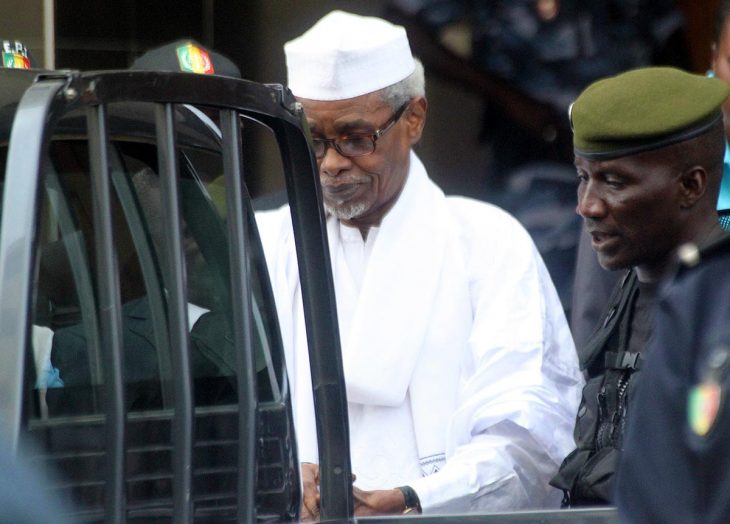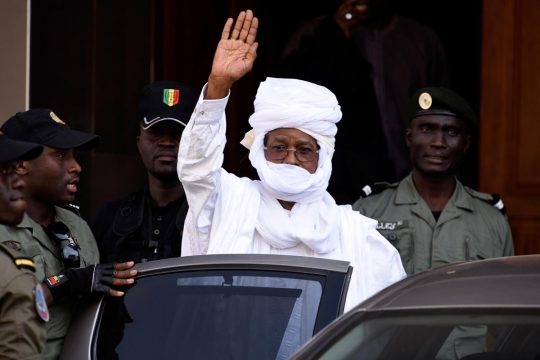"I am in favour of the request for release of Hissène Habré," said renowned human rights defender Alioune Tine on April 10 in the Senegalese newspaper "Le Quotidien". This followed a request by lawyers of the former Chadian president, who was sentenced to life imprisonment in 2016, asking for a six-month release on "health grounds". Tine’s statement came as a big surprise to many Senegalese, especially the Association of Victims of the Crimes of Hissène Habré’s Regime (AVCRHH). The AVCRHH has relied for years on the support of Alioune Tine, former regional director of Amnesty International and one of the most committed activists in the struggle to bring Habré to justice for crimes committed in Chad between 1982 and 1990.
So what happened to make this prominent human rights activist change his position? Also in "Le Quotidien", Tine said he had been sensitized by Thierno Madani Tall. Tall is not just anyone. He is the representative of the Khalifa (leaders) of the Omarian family in Dakar, one of the main religious families of the Tidjanyya brotherhood, to which some 60% of Senegalese are said to belong and which has always shown support for Habré.
The “pious benefactor” of Ouakam
The former Chadian president has long enjoyed the support of some of Senegal's religious leaders, particularly the Omarian family. When he arrived in Senegal in 1990 after fleeing Chad, Habré was not empty-handed. He had in his suitcases a fortune estimated at 5 billion CFA francs (a little over $8 million) stolen from the Chadian treasury. He then "approached religious leaders, presenting himself as a Muslim driven from his country by enemies complicit with the West, seeking a new home. He married a Senegalese woman, a Muslim," says an observer of the political scene who wished to remain anonymous. This approach allowed him to quickly gain the sympathy of these large, powerful families. Some of their clerics see him as "a good and pious man". He is "the guest to be taken care of," adds the same source.
In his smart Dakar neighborhood of Ouakam, Habré was also "friendly" and above all "generous" with his neighbours, the Lebous dignitaries (a community on the Senegalese coast) and certain intellectuals with whom he maintained good relations. "He participated in the life of the community, went to the mosque that he helped finance, provided financial support to the village for cultural, sports or religious activities," says a resident of Ouakam. Some say it is thanks to his money he was able to build this local protection that he still enjoys today. On the eve of his trial in 2015, these communities showed him noisy support. They made many calls and held press conferences pleading his case and denouncing his trial. Their efforts did not succeed in preventing Habré’s trial and conviction for crimes against humanity, torture and war crimes, but they still want to shorten his stay in prison.
Defence move fails
His lawyers cited health reasons and the threat of Covid-19 as reasons for their request for his release from jail. But these reasons are not justified, according to a judicial source. "Habré is being held in a special wing where he is alone. He is not interacting with other prisoners. He is therefore not exposed to the coronavirus," the source said. In addition, new Covid-19 cases in Senegal have dropped from 300-400 per day a month ago to only 15, according to figures released on April 20 by the Ministry of Health and Social Action.
On April 16, four United Nations rapporteurs expressed "grave concerns about a temporary release of Chad's former president in the context of the Covid-19 pandemic, without any apparent public health justification, in violation of international standards of accountability for gross human rights violations”. The judge finally ruled along the same lines, rejecting the request submitted by Habré's lawyers on March 29.
A year ago on April 6, 2020, Habré was allowed to leave the special wing of the Cap Manuel prison in Dakar to join his family. He was placed under house arrest for a 60-day leave of absence from jail. But the support of his backers, joined unexpectedly by Alioune Tine, was not enough to renew the operation this year. The day after the April 20 decision, his lawyers could only issue a statement denouncing a system that "denies a man his most basic right," namely the right to health.
Still no reparations for the victims
Assane Dioma Ndiaye, lawyer for the civil parties, says supporting Habré is inappropriate. He prefers to stress the "painful" fate of the victims. "Nothing has been done to implement their reparation,” he says. “The victims' compensation funds have not been set up as stipulated by the decision of the Extraordinary African Chambers (EAC)", the inter-African tribunal that was specially established to try Habré.
In its ruling, the EAC awarded the victims of Habré's regime 82 billion CFA francs (just over 125 million euros) in compensation. Lawyers for the civil parties immediately managed to obtain the freezing of some of Habré’s accounts and seizure of two of his houses. But to date, says Ndiaye, they have not been able to proceed with the sale of the seized property because of "coordination problems between the various civil parties”. The lawyer also deplores the "passive" attitude of the African Union, which has been slow to appoint members of the committee in charge of the Victims' Compensation Trust Fund. Habré's continued detention will no doubt be only a partial consolation for his victims.







